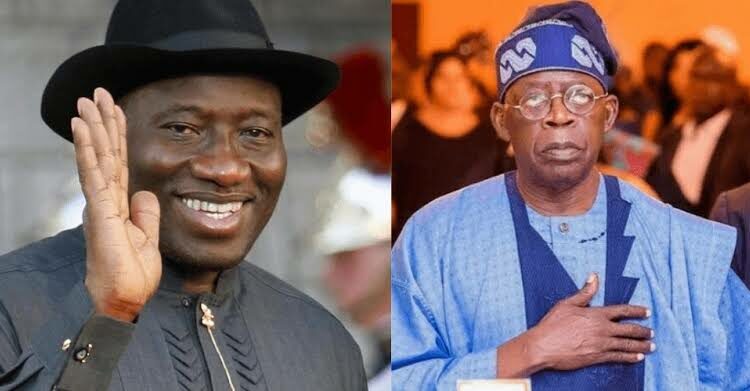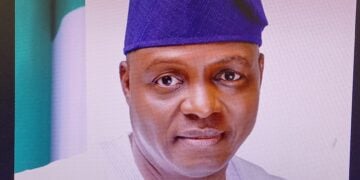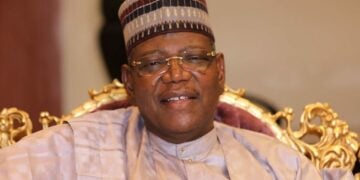President Bola Ahmed Tinubu has implored Nigerian leaders to recommit to the values of inclusivity, accountability and transparency to guarantee a democracy that flourishes and endures for generations to come.
According to him, after 25 years of uninterrupted democracy, it is time for all Nigerians to partake “in building a nation where every voice is heard, where every potential is realised, and where every citizen is empowered to contribute to the collective good”.
The President, who spoke yesterday during the 2024 Democracy Day Lecture at the Banquet Hall of the Presidential Villa, Abuja, noted that at this point of the nation’s democratic journey, every Nigerian, irrespective of background, must be given a chance to contribute to the nation’s shared destiny.
Tinubu, who was represented at the event by his deputy, Vice President Kashim Shettima stated through his spokesman, Stanley Nkwocha, that the lesson learned after 25 years is that democracy is a journey that must be constantly nurtured and watched closely.
He said: “Our progress has been marked by both triumphs and trials, each serving as a reminder of the preciousness of our democratic principles. As we move forward, let us recommit to the values of inclusivity, accountability, and transparency, ensuring that our democracy not only endures but flourishes for generations to come.
“The future of Nigeria lies in our hands, in our ability to dream, innovate, and act with courage and conviction. Let us embrace this moment with a renewed sense of purpose, knowing that the path we tread today will shape the Nigeria of tomorrow. This is an invitation for each of us to build a nation where every voice is heard, every potential is realised, and every citizen is empowered to contribute to the collective good.”
Tinubu observed that for the nation to have sustained democracy for 25 years, the longest in the country’s checkered history, is evidence of “the enduring sacrifices of several generations of patriots.”
Passing his verdict on the democratic journey so far, the president declared that 25 years was time enough to ascertain the effectiveness of any experiment.
“Our democratic experience, despite the lows and the highs, is a telling referendum on our aspiration to build a nation that serves the interests of all, a federation that has not conspired against any benign group.
“We are here because the alternative is a descent into dystopia. Today is a moment to reflect on our journey so far. The tragedies Nigeria survived to settle for this democracy, the fourth of such experiments, must inspire each of us to play our part to honour the labour of our founding fathers and mothers and remind ourselves of the principles that drove their resolve to build for us a diverse nation that has defied the pessimism of detached agents of anarchy,” he added.
Noting that it is not just a day of remembrance, the President stated that it is a call to action, even as he said young and competent Nigerians, including the patriotic and innovative, must all be engaged in crafting a succession plan that secures the desired future.
“It is through their energy, creativity, and commitment that we will build a resilient Nigeria against tomorrow’s challenges. Let us, therefore, pledge to create an environment where every Nigerian, regardless of background, has the opportunity to contribute to our shared destiny,” the president further noted.
Earlier, secretary to the government of the federation, George Akume, had highlighted the sacrifices made by the country’s heroes and heroines who fought for democracy, with many paying the ultimate price. He saluted the courage of Nigerians in upholding democratic values despite challenges.
“Our democratic journey is one of optimism as reversal is never contemplated. Today provides an opportunity to salute the resilience of our people in believing in democracy,” Akume stated.
Jonathan Seeks Reforms To End Do-or-Die Politics
In his speech at the event, former President Goodluck Jonathan called for reforms in Nigeria’s democratic model to curb the pervading “do-or-die” politics that is destructive to consolidating democracy in the country.
According to him, the “winner-takes-all” approach leads to desperation and an avalanche of litigation after every election cycle, which he describes as “very embarrassing.”
Jonathan stated, “The avalanche of litigation that follows every round of elections in Nigeria is very embarrassing. And because of the kind of democracy we practise, democracy is built on all kinds of sentiments.
He called on Nigerians to play down their penchant for regional and religious politics in the next 25 years so that the country can move forward.
“Either the way you worship God or the map of the country where you come from, you both have to make sure that this is diluted in the next 25 years. If we must have a solid and enduring democracy, I know you and the president, Bola Ahmed Tinubu, who was a crucial actor in the June 12 crisis, can navigate that process.”
He noted that the current model, where parties that gain significant votes have no representation, fuels intense do-or-die politics and threatens Nigeria’s democratic gains over the past 25 years.
The former president urged the National Assembly to explore more inclusive models that reinforce political justice and social cohesion rather than the prevailing zero-sum approach.
Jonathan also warned against building a democracy anchored on ethnic, religious or regional sentiments, stating that “a democracy built on ethnicity does not endure; it will continue to wobble.”
He commended Vice President Kashim Shettima, who is starting the next 25 years as a “midwife,” calling on him and President Tinubu to navigate the process of entrenching a more inclusive and enduring democracy over the coming years.
The event celebrated the 25th anniversary of the return to democratic rule in 1999 after decades of military dictatorship.
Jonathan applauded the milestone as worthy of celebration but emphasized that more work remains to deepen Nigeria’s democratic roots and ensure dividends are felt by all citizens.
Masari Warns Of Waning Trust In Government
On his part, former Katsina State Governor Aminu Bello Masari warned that public confidence in democracy is waning.
He cited a 2022 survey showing over three-quarters of Nigerians were unsatisfied with how it is working.
In his keynote address at the 2024 Democracy Day Anniversary Lecture, at the Presidential Villa, Masari celebrated the major milestone and cited Nigeria’s democratic progress, including seven straight election cycles.
He, however, sounded the alarm over signs that citizens are losing faith in democracy’s ability to deliver on their aspirations.
“According to a 2022 survey by Afrobarometer, 70 percent of Nigerians polled prefer democracy to other forms of government. That is the good news,” Masari said, “but 77 per cent of those surveyed are unsatisfied with how democracy works in Nigeria, up from 57 percent in 2017. This should get us worried.”
Masari, a former speaker of the House of Representatives, urged political leaders to heed these worrying perceptions and work urgently to address the roots of public disillusionment by bettering governance and improving economic conditions.
“We need to understand why our people are gradually losing faith in democracy, and we need to strengthen their faith in democracy consciously. People do not want democracy for its sake. They want democracy to translate to material benefits for them,” Masari stressed.
He called for prioritising efforts to reduce poverty, inequality and lack of opportunities, especially among Nigeria’s burgeonving youth population.
Masari proposed redefining local governance by devolving more powers to states to structure local administrations as suited to their needs.
He appealed to the public to retain patience, noting other nations went through challenging phases in their democratic journeys. He, however, clarified that democracy’s survival hinges on citizens continuing to see its value.
Tinubu Vows to Build ‘Economic Democracy’
President Bola Tinubu has vowed that his administration will build an “economic democracy” to complement the nation’s hard-won political democracy.
In a nationwide broadcast this morning to mark Democracy Day, Tinubu declared that achieving broad-based economic empowerment is now paramount after decades of military dictatorship and flawed governance.
“As we celebrate the enshrinement of our political democracy, let us commit ourselves to the fulfillment of its equally important counterpart, the realisation of our economic democracy,” Tinubu said.
He paid tribute to the heroes who sacrificed their lives in the struggle for democracy, including MKO Abiola, the annulled 1993 presidential election winner.
Tinubu acknowledged that while elections are just one aspect, true democracy allows freedom of thought, movement, and pursuit of legitimate endeavours.
He stated that democracy demands respect for differing viewpoints instead of resolving differences through force.
The president warned against those seeking to undermine or destroy Nigeria’s democracy for their own interests.
He vowed to preserve democratic rights, freedoms, and liberties, declaring, “I pledge to do whatever is necessary to cement democracy as our way of life.”
The president acknowledged the economic hardships facing many Nigerians, saying the economy has been imbalanced due to an overdependence on oil revenues.
He defended his administration’s reforms as critical to establishing a stronger foundation for future growth and prosperity.
“The reforms we have initiated are intended to create a stronger foundation for future growth. There is no doubt the reforms have occasioned hardship. Yet, they are necessary repairs required to fix the economy over the long run so that everyone has access to economic opportunity, fair pay and compensation for his endeavour and labour,” Tinubu stated.
To address the strain on the cost of living, Tinubu revealed that his government has negotiated with labour leaders on a new national minimum wage bill that will soon go to the National Assembly.
He contrasted his “reasoned discussion and principled compromise” approach with how a “dictatorial government” might have cracked down on worker protests.
Tinubu, who was involved in the pro-democracy struggle against military rule in the 1990s, said economic democracy means a system where “no man is oppressed” and all citizens can freely pursue legitimate endeavors.
“Our national greatness will not be achieved by travelling the easy road. It can only be achieved by taking the right one,” Tinubu declared, quoting former U.S. President Franklin D. Roosevelt. “We know the proper way forward and shall take it!”
The president recommitted himself and the nation to safeguarding democratic governance and continuing vital economic reforms despite the hardships they have caused.
The President declared he is “morally and constitutionally bound to preserve this precious form of governance” and vowed “to do my utmost best to protect your rights, freedoms, and liberties as citizens of Nigeria.”
He praised Nigerians for rising to the challenge of overthrowing dictatorships but warned, “The real test is whether we shall lower our guards as the shadow of despotism and its evident physical danger fade.”
The President acknowledged the country’s economic difficulties, stemming from an over-reliance on oil revenues. “Our economy has been in desperate need of reform for decades…The reforms we have initiated are intended to create a stronger, better foundation for future growth,” he stated.
While admitting the reforms “have occasioned hardship,” he insisted they are “necessary repairs required to fix the economy over the long run so that everyone has access to economic opportunity.”
The President vowed to build “a Nigeria where no man is oppressed” and urged national unity, declaring “Together, let us move Nigeria forward…Let’s keep the torch lit for generations to come.”
The president called on Nigerians to move the country forward together, seizing the opportunities offered by democracy.
He expressed optimism for an abundant future within reach, stating, “The initial rays of a brighter tomorrow now appear on the early horizon.”





